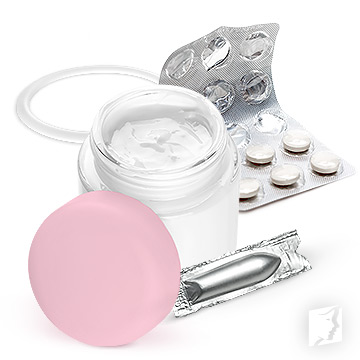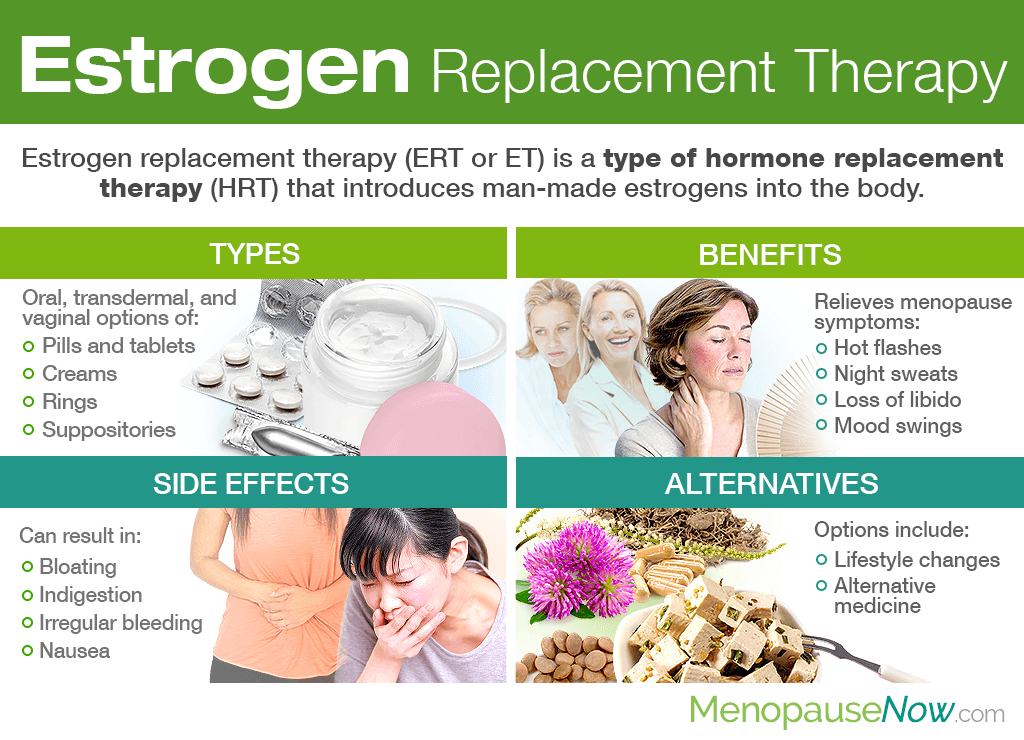Estrogen replacement therapy is on the tongues of many women who found reprieve from their harrying symptoms with its use while passing through the menopausal transition. However, diving head first into taking estrogen hormone therapy, it is crucial to first understand its exact implications.
Continue reading to learn more about estrogen replacement therapy, including various types available, its benefits, side effects, and more in order to be the driving force behind your hormonal health today.
About Estrogen Replacement Therapy
Estrogen replacement therapy (ERT or ET) is a type of hormone replacement therapy (HRT) that introduces exogenous, or man-made, estrogens into the body.
Women undergo estrogen replacement therapy in order to relieve symptoms of hormonal imbalance.
Nevertheless, although this type of HRT can be taken by women of all ages, its use is recommended only for postmenopausal women, those who have had a hysterectomy, or women who have passed through early menopause.
Types of Estrogen Replacement Therapy

Types of estrogen replacement include the following:
- Oral options, like tablets and pills
- Transdermal options, such as patches, creams, gels, sprays, or implants
- Vaginal options, including rings, creams, and suppositories
It is important to speak with your doctor about which type of estrogen hormone therapy is best for you based on your specific hormonal needs and symptoms.
For example, women who are suffering mainly from the vaginal symptoms of menopause - dyspareunia, vaginal dryness, etc. - may be prescribed a localized vaginal cream instead of a daily prescription pill.
Estrogen Replacement Therapy Benefits

Estrogen replacement is prescribed to women to relieve menopause symptoms, such as:
- Hot flashes
- Night sweats
- Loss of libido
- Mood swings
- Irritability
- Anxiety
- Digestive problems
- Headaches
- And more
Also, it is believed that estrogen replacement therapy may help protect against osteoporosis in postmenopausal women.
Estrogen Replacement Therapy Side Effects

Estrogen therapy side effects include the following:
- Mood swings
- Headaches
- Irregular bleeding
- Water retention
- Breast soreness
- Nausea
- Bloating
- Indigestion
- Among others
ERT may also increase the risk of serious health conditions - such as heart disease, stroke, blood clots, or breast cancer - depending on a woman's health factors, type of hormone therapy, and medical history.
As such, estrogen replacement should not be taken by women who have had breast, ovarian, or endometrial cancer; blood clots; liver disease; unexplained vaginal bleeding; or strokes.
Women who pursue ERT are recommended to do so on the lowest dose possible only if menopausal symptoms are severe. If they started menopause after age 45 and are not bothered by the symptoms, ERT is not considered necessary.
Alternatives to Estrogen Therapy

Instead of introducing synthetic hormones into the body through estrogen replacement therapy, women are encouraged to pursue natural and effective menopause symptoms treatments that will help them not only allay symptoms, but also reduce the risk of osteoporosis and heart disease.
These natural treatments promote the implementation of lifestyle changes of an optimized diet rich in plant-based estrogens, healthy habits of limiting caffeine and alcohol as well as stress-relief techniques, and regular exercise that includes a combination of aerobic and weight-bearing exercises.
For improved results, perform these measures along with the use of alternative medicine, such as phytoestrogenic herbal supplements or hormone-regulating supplements, both of which work to naturally encourage endocrine system health to optimize its hormone production.
Key Takeaways
Estrogen replacement therapy (ERT or ET) is a hormone replacement therapy (HRT) that contains synthetic estrogens. It can be taken orally or applied transdermally or vaginally, depending upon a woman's hormonal needs and preference. ERT is used to relieve severe symptoms of hormonal imbalance, such as hot flashes, night sweats, low libido, vaginal dryness, mood swings, irritability, and more. Nevertheless, the side effects of estrogen hormone replacement therapy along with an increased risk of developing serious health conditions often deter women from undergoing ERT, leading them to pursue alternatives to estrogen therapy. Through natural and effective methods that include lifestyle changes alongside alternative medicine, women can healthily allay symptoms of hormonal imbalance while promoting endocrine system well-being.
Sources
- Cleveland Clinic. (2017). Hormone Therapy. Retrieved May 14, 2019, from https://my.clevelandclinic.org/health/treatments/15245-hormone-therapy
- Mayo Clinic. (2018). Hormone therapy: Is it right for you? Retrieved May 14, 2019, from https://www.mayoclinic.org/diseases-conditions/menopause/in-depth/hormone-therapy/art-20046372
- MedlinePlus. (2019). Types of hormone therapy. Retrieved May 14, 2019, from https://medlineplus.gov/ency/patientinstructions/000695.htm
- National Cancer Institute. (n.d.). Estrogen replacement therapy. Retrieved May 14, 2019, from https://www.cancer.gov/publications/dictionaries/cancer-terms/def/estrogen-replacement-therapy
- NHS. (2016). Side effects: Hormone replacement therapy (HRT). Retrieved May 14, 2019, from https://www.nhs.uk/conditions/hormone-replacement-therapy-hrt/side-effects/

